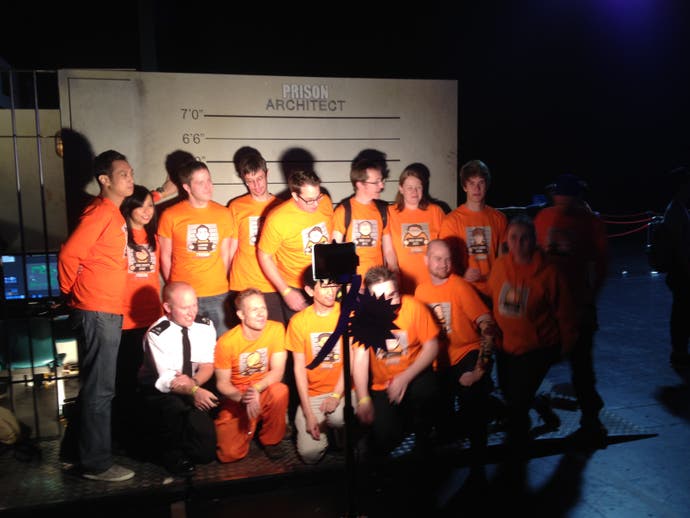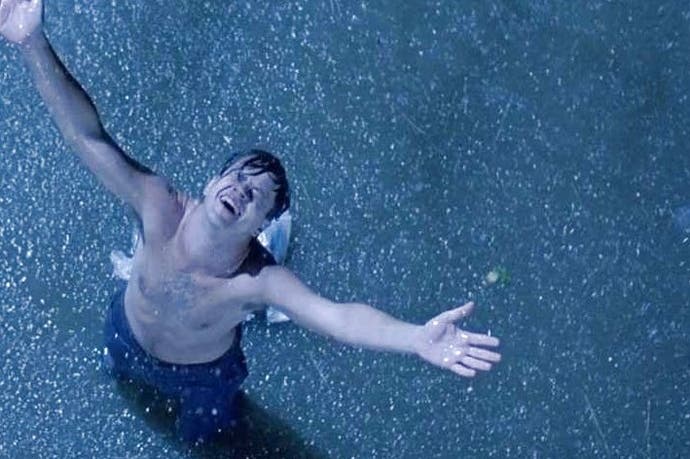Prison Architect earns $19m from 1.25m sales - but what's next?
"The next game we make will not be about prisons..."
Prison Architect, the game that saved Introversion, did so in spectacular style: to date it has earned more than $19m from over 1.25m sales.
That $19m (and something) figure is accurate as of around 1.30pm (BST) Saturday, 26th September, which is when Introversion founding director Mark Morris shows me it on his phone in some sort of data-tracking app. The 1.25m sales milestone is mentioned a few times during our interview.
To think, in 2010 this company was on the verge of collapse, with only Mark Morris and fellow founding director Chris Delay left. Now the two other founding directors - Tom Arundel and John Knottenbelt - are back, and a total of 16 people have helped bring Prison Architect to full release (it leaves Early Access 6th October).
But what's next - when does Chris Delay start making something new?

"Well I don't know..." answers Delay, cagily.
"He's already done it," butts in Morris.
"That's partly the answer," continues Delay. "I've already done it a little bit, only as prototypes, and I'll be looking for the right time to do that. But we've got to get Prison Architect out and properly supported and get the team in a good cycle so they're producing updates for the game."
"Chris has been working on Prison Architect for five years," adds Morris, "that's the other thing to remember. Five years is a long time to be working on a project; there just comes a time when you need to be working on something different.
"The challenge for us is going to be moving Chris off onto something new [and] having another team continue with Prison Architect without f***ing it up. Because this is the other fear: what neither of us want is it to go wrong, where we just start shovelling shit into it."
To be clear: the focus now and for the immediate future is Prison Architect, make no mistake about that.
"We've been in this business for 15 years and Prison Architect is the hit, you know," says Morris, "so we would be silly to kill it off too early. We know we're going to be updating this game and we know we're going to be updating this game for almost certainly the whole of next year.
"But," he adds, "over next year, we will be doing new things as well, so the company will probably grow slightly to have a Prison Architect team and there will be a 'new stuff' team.
"The next game we make will not be about prisons, and it will not be about building. It will be about something completely different. But we don't want to get distracted now because it's all about 6th October."
To hit rock bottom, as Introversion did, is incredibly hard, but it does give you an invaluable perspective on everything that comes next.
"We've learnt an awful lot," nods Morris.
"We don't take anything for granted anymore," adds Delay. "After Defcon's launch we were in really rude health, really solid health, and within four years we were almost gone. You can blow your money very quickly in video games."
Then Morris goes for a monologue, but bear with it, it's worth it.
"I remember in the Darwinia+ days," he begins. "It was a really difficult time, and during that time to try and stop myself going absolutely insane I started reading biographies of some of the big entrepreneurs like Simon Cowell and Richard Branson. And there's a pattern. And the pattern is that they all go bankrupt at about 29, which is about when we went bankrupt.
"What happens is you've got this entrepreneurial spirit which is about driving forward, but with that spirit comes, by definition, a large dollop of arrogance, which makes you think you know exactly what you're doing. You make a couple of mistakes but you do OK, so you build this wall which is a little bit shaky - and then the whole thing collapses.
"Simon Cowell had to get on the train out of London and go and live with his parents when he was about 32, and then he came back and created X-Factor and all the rest of it. When I was reading those stories [I was] thinking 'you'll be all right, Mark', and then Introversion conformed to exactly that pattern.
"Once the company was almost dead in the water and Chris and I started talking to each other again, there was no baggage," he goes on. "There was no 'we have to do this console deal because we signed it five years ago', or 'we have to have this office'; the digging our heels in ... softened as well because both of us had realised what a clusterf*** Introversion had become, partly through my desire to drive Darwinia+ forward, partly through his desire to finish Subversion, the game that never was.
"And suddenly all of the noise that we had from the past, together with that arrogance - probably still a little bit there - really being smashed ... we suddenly found this place where we were able to work so well together, solve so many problems. And then we delivered Prison Architect and it just worked and worked and worked, and we're facing a new challenge with what we do afterwards. But I hope that these slightly more tempered personalities... It's very rare that there's any shouting or foot-stamping in the board meetings, whereas in our early days that would have absolutely characterised how we made decisions."
In other words, Introversion has enough money for the foreseeable future, but it's humble with it, and not about to blow it.
"The company is very, very healthy," says Morris. "Also, we think that Prison Architect could be the biggest hit of the next 15 years at Introversion, so we've been very prudent with what's happening with the resources that it's generating, because we know that we can never run out of money again now. Not because we've made so much but because it would be criminally negligent if we ever had to go back cap in hand."
Prison Architect leaves Early Access and launches in full on 6th October. It welcomes a full story campaign as well as a new Escape mode on the day. It costs £19.99.



